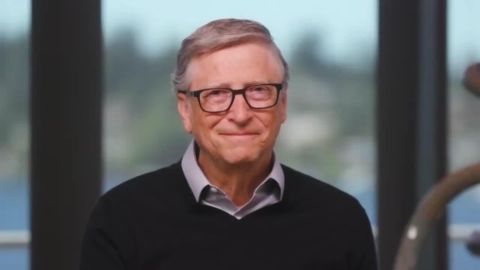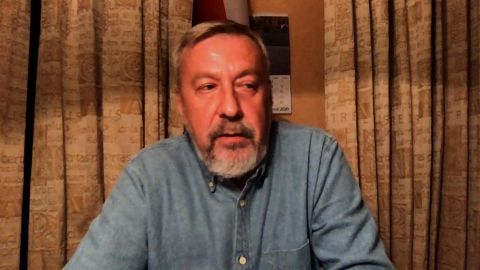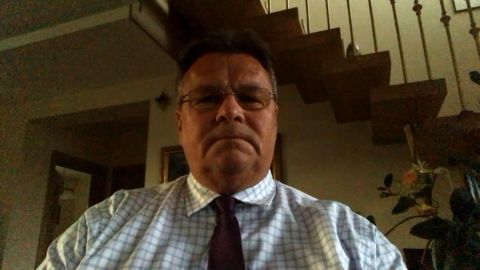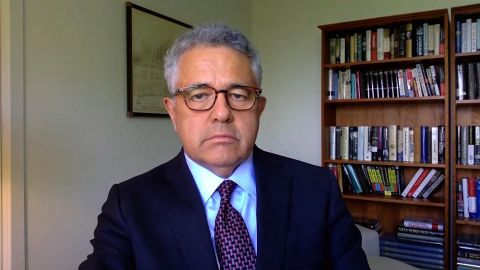Read Transcript EXPAND
CHRISTIANE AMANPOUR: There are now 20 million cases worldwide. And our next guest is behind many of the efforts to develop a vaccine. He, of course, is the Microsoft founder and philanthropist, Bill Gates. And he’s pouring billions of dollars to help ensure affordable access to a vaccine. And here is speaking to our Walter Isaacson about that and about why he thinks so much of the testing being done in America is a complete waste.
WALTER ISAACSON: Thank you, Christiane. And Bill Gates, welcome to the show.
BILL GATES, PHILANTHROPIST, GATES FOUNDATION: Thank you.
ISAACSON: Tell me which vaccines you’re most hopeful and optimistic about right now.
GATES: Well, we have six that will be in phase 3 trials by the end of September, and all of them have shown reasonable phase 1 data and animal data. Weirdly, some of the later ones are the most promising. For example, Novavax with an adjuvant that is known to create strong immunity in elderly people. But I expect several of these six will succeed. Some of them are much lower cost than others. The MRNA platform, although in the long run, it’s probably the most promising, today that manufacturing scale up and cost manufacturers higher than some of the other constructs. So, we need a less than $3 vaccine to be able to afford getting it out to the world at large.
ISAACSON: How are you going to make sure that it get — how are we going to make sure it gets rolled out fairly?
GATES: Well, there is discussions of whether the U.S. supplemental bill includes money for the international response. The U.S. actually deserves the best grade of funding R&D on these vaccines. All six of the companies have either funding or purchasing agreements that help them go full speed ahead. As yet, though, the money, which would be at least 10 to 12 billion to buy the vaccines out there, and that’s making the companies a little hesitant to build the extra factories that we need as fast as they should. So, if we can get that resolved with the U.S. showing leadership like it has on many global health things, that would be a fantastic step and probably the most important thing for bringing this pandemic to an end.
ISAACSON: You just said if we can get the U.S. to show global leadership. We’ve been retrenching from that for a few years now. What do we need to show global leadership?
GATES: Well, that’s reasonably straightforward. If we would put 4 billion into the special coronavirus fund that the vaccine organization, GABI, has created, then, you know, we could raise the rest of the money from others. Likewise, if we use global fund, which would then take on COVID as a fourth disease that it would provide therapeutics for, also, you know, 4 billion there. So, you know, compared to the trillions of economic damage or supplemental thing, you know, getting the international response showing our strong world to get that going, you know, 8 billion is an incredible bargain.
ISAACSON: So, are you pushing congressmen, senators, are you pushing politically, you’re trying to get the administration to put this in a supplemental?
GATES: Yes, I spend a lot of my days doing everything I can on that, and people say from both parties in the Congress and in the executive branch they’ve been open-minded to it. You know, we need to make sure that there are so many other big things that are important that this doesn’t get lost and that it gets fully funded at the 8 billion.
ISAACSON: You said that you’ve been talking to people in the executive branch about hoping that the supplemental will include things for global relief. Who have you been talking to?
GATES: Well, if you take — you know, I talked to Dr. Fauci on a regular basis, because sharing what the foundation has seen on the various trials and intervention, you know, it’s great to get his perspective. That’s been super valuable. But I’ve also at times talked to Secretary Pompeo, the vice president, you know, Debbie Birx is somebody we know well because she did a great job as the HIV leader in the government, now she’s in a key position. So, there is a regular dialogue there that now I really focus that on, you know, let’s get this reasonably modest, less than 1 percent, for that international response, both for humanitarian reasons, also strategic reasons and, you know, it will keep coming back to the U.S. and disrupt everything we do until we stop it everywhere in the world. So, of all the global health things I’ve ever made a plea for, this has actually been stronger, and we have to have bipartisan engagement. The U.S. is the best on HIV and malaria, and, you know, all we have to do is complement the R&D with the procurement money.
ISAACSON: There’s a push at times, though, for the FDA to approve vaccines, especially in this case. I can almost understand it with a pretty serious of the whole economy to say, look, we know they’re safe. We think they are official. We haven’t fully gone through phase 3, but just like Russia is doing and others, we’re going to give it emergency use because we know it’s safe and we think it’s probably efficient. Do you think we should speed up the process for cases like this, the coronavirus case?
GATES: You have to be very, very careful, because if you’re not careful with one vaccine, then it can ruin the reputation of all the vaccines and the number of lives at risked globally, then if vaccines, you know, are used a lot less, that’s pretty substantial. So, you know, building up the safety database, you know, looking at where we really know enough that we feel good about that. You know, I hope that’s done well. And I — you know, what we’ve seen so far, I don’t know all the internal discussions, but so far, the efficacy protocol that’s being used is quite good.
ISAACSON: Why has testing gotten so messed up in this country?
GATES: Well, the ideal would have been to have a CDC Web site that would prioritize who gets tested, and that you don’t reimburse results that are coming back after they’re not as actionable. So, you really need a 24-hour turnaround. There were some innovations. We drove a thing where, instead of jamming the swab way back and using a health care worker, you can just personally put it up to the tip of your nose. And we proved that that was as accurate. It’s called the mid-turbinate. And some people are adopting that. So, we didn’t, in advance, realize that getting the commercial providers going was so important. So, the U.S. was the slowest in getting that piece together. And then there was a lot of talk about who would drive doing the Web site and the prioritization, and that really didn’t come together. So, right now, you have a lot of people who can get tests weekly, whereas a lot of communities either don’t have access or they get these delayed results.
ISAACSON: What are the delayed results? Are they useful?
GATES: No. They’re useful, so you can write an apology note to the people that you have been exposed to over that time period.
ISAACSON: What is a way to push the health services and others to make sure they get the results back in 24 hours?
GATES: That’s trivial. You just don’t reimburse for anything over 48 hours, and you give a bonus for 24 vs. 48. And it’s easy that then you will just clear the backlog, because the actual batch processing logistics, you can do 24 hours, particularly if you use the swab approach we talked about or you have the drive-in testing, where you get the sample to the machine very quickly.
ISAACSON: What happens when you talk to the White House people and the administration about testing? Are they listening to you?
GATES: I don’t think criticizing them will make them more open-minded to my input.
(LAUGHTER)
GATES: So, we’re able to get people on the phone. And, as yet, some of the things we’re asking them to do haven’t become concrete. It’s never been clear who’s in charge. At first, it was a conversation with Azar. Then there were other people in the White House involved. I wish I’d done a better job getting the message of how to improve testing. But there’s still a chance to do it.
ISAACSON: And what would that be, through the states, or should there be a national plan for testing?
GATES: Oh, no, this is all national. The CDC is the trusted brand name. The Web site of who should be prioritized, you don’t just have rich people tested, testing their delivery people every week, vs. the communities where the disease is highly prevalent. You have got to use a CDC Web site. Asking states to pull something like that together, as you know, isn’t going to work that well. And the reimbursement is all at the federal level as well. So the incentive to say, no, we don’t pay for valueless results, that’s got to be fixed at the federal level.
ISAACSON: So, it’s got to be done with the CDC. But where the heck has the CDC been in the past few months?
GATES: In Atlanta.
(LAUGHTER)
ISAACSON: Yes, but go — I mean, aren’t they like the premier agency? Didn’t we always look up to them? And now I’m feeling like I’m not hearing much from them.
GATES: They’re the best in the world. Even they, as we do the postmortem, will have to say that, in February and March, there’s some things they could have done better. But no doubt they’re the best in the world. And they’d been gathering the statistics. People tried to take them out of that. But they maintain that position. They haven’t been much of the communication, which they’re really trained to do. There’s a chance where they could be brought in. They did warn about opening up when the cases were still going up. But those warnings kind of were not highly visible, compared to other communication. So, fine, we made that mistake. Now we need to go forward. We do think that this epidemic can be brought under control. I’m not trying to be super negative. It’s more and more people have been infected, that this — the amount of spread is going to start going down. And then, of course, the vaccine will make a dramatic difference. Even before that, we will have therapeutics to reduce the death rate.
ISAACSON: You say that the CDC is the best in the world at doing this. Have they given us good enough guidance about whether we should be opening our schools?
GATES: Well, there are things that are complicated. The idea that the benefits to having young people in school is very high, and that you can get — switch to not having the older teachers or teachers who live in multigenerational households and have exposure to older people, it’s very hard here in August to figure out, OK, what are the distancing plans and how dense is the classroom? This is pretty complicated to say to people, OK, in a month, you have to figure this out. I’m afraid, the fall, there won’t be that many kids in public school. As we get our act together, having the younger kids go in, and having the right protections for the adults that are in there, I do think that’s achievable to get at least K through eight back in a lot of parts of the country. So, we should work together. It shouldn’t be that one side is for school, one side is against. It’s absolutely right that we want school in place. And people need to remember, most of the medical damage of this is to elderly people. So, it’s breaking the connection between young people who are infected and older people by picking younger teachers and teachers that don’t have that connection back up to the elderly. Then you can make sure that the health cost is fairly low. And, hopefully, by early next year, between all these things, the therapeutics, reducing the death rate, the time to plan, and the vaccine being fairly imminent, hopefully, for the second half of this year, we get most young kids back.
ISAACSON: You talk about these nutjob, weird, wild conspiracy theorists, and they tend to focus on you, as if you have got some weird reason for doing vaccines, or you want to implant chips or whatever. Why have you become such a lightning rod? Why has all this happened?
GATES: Yes, I don’t know. To be clear, it’s all false. We have been involved with vaccines in order to save lives. And, actually, over the last 20 years, the global health community has had immense success and has cut childhood death, under-5 deaths, in half from 10 million a year down to less than five million. And so I am caught a little bit flat-footed in saying in, no, I didn’t expect this, and I don’t know fully understand it. It’s understandable that, during a pandemic, people are anxious. They’re looking, in some cases, for simple explanations. Social media tends to take titillating things and allow them to move at high speed, whereas the truth about the boring fact that we do vaccines to save lives doesn’t — isn’t as titillating. Why would you click on that? And so this is a tricky time, where the ability of social media to see what the messages are and perhaps slow down some, mark some as not true, there’s this big debate about that very broadly.
ISAACSON: Your former company Microsoft might now be acquiring TikTok. But do you think that, in general, that — I think you used the word poisoned chalice once — that there’s some danger of having to get into this arena of social media for a company like Microsoft?
GATES: Well, that would draw Microsoft into the competition there, trying to say, hey, our service does this better, and it’s a choice that you can use. It will bring a lot of complexity with it. And so if the upside and the opportunity to innovate wasn’t gigantic, it won’t be worth doing. But my advice to Satya has been, hey, you should explore that in great depth, because there could be a great opportunity that would come out of that.
ISAACSON: Do you think the Trump administration should be trying to block TikTok in the United States?
GATES: I think we should have clear rules about what’s allowed and what’s not allowed. Clearly, the social media companies didn’t have a very good chance of getting into China for a variety of reasons. And if somebody was saying, OK, this is some principle of reciprocality or something — anyway, I think the U.S.-China relations, which will — won’t be great anytime soon, the more we can state clear principles of what we predictably will allow and what we won’t allow, and they do the same, that there will be less a negative fallout from these things. So, this was pretty new when it came up. And now people have to articulate, OK, what does this mean for other activities? How should China respond to buying jets or software or drugs or anything from the West? Should they — how should they look at that? So, this — this is a area that the policy is definitely up in the air right now.
ISAACSON: In the three decades I have known you, I have never really known your politics. I don’t know what you’re registered, your party. You have stayed very apolitical. And yet everything you have said during this interview comes down to being somewhat upset about the current direction, the current way we have been going globally and with the pandemic. Have you begun to reconsider and think that maybe you should be more involved in the political discourse, not just the philanthropic one?
GATES: Well, I like to save my voice for a few areas that I have put a lot of resources into and spend a lot of time on, so global health, some actions around education, the climate change. And it’s unfortunate if that ends up marking you as a partisan that you care about climate change or you care about international generosity. Historically, global health work was very bipartisan. The desire to improve the U.S. education system was very bipartisan. George Bush started the HIV thing, which is the most generous health thing ever done. But he also got Democratic support as he did that. And that’s been maintained over time. So, the Congress is still pretty good on these issues. And I don’t think just being on one side or the other is the best thing for me. I do believe in excellent analysis and thinking. So, whenever the government doesn’t appear to have a good long-term plan for climate change or certain aspects of the pandemic, I can come across — even though I’m just trying to make the technology planning statement, sadly, that can come across as political.
ISAACSON: Bill Gates, as always, been very interesting. Thank you for joining us.
GATES: Thanks, Walter.
About This Episode EXPAND
Lithuania’s foreign minister discusses the unrest in Belarus following this week’s disputed presidential election result. Former Belarusian Presidential Candidate Andrei Sannikov gives his take on the situation. Bill Gates joins Walter Isaacson to discuss the U.S. government’s approach to testing and vaccines. Jeffrey Toobin discusses his new book “True Crimes and Misdemeanors.”
LEARN MORE



